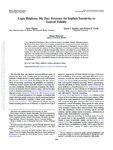Logic brightens my day: Evidence for implicit sensitivity to logical validity.
| dc.contributor.author | Trippas, D | |
| dc.contributor.author | Handley, SJ | |
| dc.contributor.author | Verde, Michael | |
| dc.contributor.author | Morsanyi, K | |
| dc.date.accessioned | 2017-09-15T13:58:50Z | |
| dc.date.available | 2017-09-15T13:58:50Z | |
| dc.date.issued | 2016-09 | |
| dc.identifier.issn | 0278-7393 | |
| dc.identifier.issn | 1939-1285 | |
| dc.identifier.uri | http://hdl.handle.net/10026.1/9934 | |
| dc.description.abstract |
A key assumption of dual process theory is that reasoning is an explicit, effortful, deliberative process. The present study offers evidence for an implicit, possibly intuitive component of reasoning. Participants were shown sentences embedded in logically valid or invalid arguments. Participants were not asked to reason but instead rated the sentences for liking (Experiment 1) and physical brightness (Experiments 2-3). Sentences that followed logically from preceding sentences were judged to be more likable and brighter. Two other factors thought to be linked to implicit processing-sentence believability and facial expression-had similar effects on liking and brightness ratings. The authors conclude that sensitivity to logical structure was implicit, occurring potentially automatically and outside of awareness. They discuss the results within a fluency misattribution framework and make reference to the literature on discourse comprehension. (PsycINFO Database Record | |
| dc.format.extent | 1448-1457 | |
| dc.format.medium | Print-Electronic | |
| dc.language | en | |
| dc.language.iso | en | |
| dc.publisher | American Psychological Association (APA) | |
| dc.subject | logic | |
| dc.subject | beliefs | |
| dc.subject | brightness | |
| dc.subject | intuition | |
| dc.subject | dual process theory | |
| dc.title | Logic brightens my day: Evidence for implicit sensitivity to logical validity. | |
| dc.type | journal-article | |
| dc.type | Journal Article | |
| plymouth.author-url | https://www.webofscience.com/api/gateway?GWVersion=2&SrcApp=PARTNER_APP&SrcAuth=LinksAMR&KeyUT=WOS:000383915900007&DestLinkType=FullRecord&DestApp=ALL_WOS&UsrCustomerID=11bb513d99f797142bcfeffcc58ea008 | |
| plymouth.issue | 9 | |
| plymouth.volume | 42 | |
| plymouth.publication-status | Published online | |
| plymouth.journal | Journal of Experimental Psychology: Learning, Memory, and Cognition | |
| dc.identifier.doi | 10.1037/xlm0000248 | |
| plymouth.organisational-group | /Plymouth | |
| plymouth.organisational-group | /Plymouth/Faculty of Health | |
| plymouth.organisational-group | /Plymouth/Faculty of Health/School of Psychology | |
| plymouth.organisational-group | /Plymouth/REF 2021 Researchers by UoA | |
| plymouth.organisational-group | /Plymouth/REF 2021 Researchers by UoA/UoA04 Psychology, Psychiatry and Neuroscience | |
| plymouth.organisational-group | /Plymouth/REF 2021 Researchers by UoA/UoA04 Psychology, Psychiatry and Neuroscience/UoA04 Psychology, Psychiatry and Neuroscience MANUAL | |
| plymouth.organisational-group | /Plymouth/Research Groups | |
| plymouth.organisational-group | /Plymouth/Research Groups/Centre for Brain, Cognition and Behaviour (CBCB) | |
| plymouth.organisational-group | /Plymouth/Research Groups/Centre for Brain, Cognition and Behaviour (CBCB)/Cognition | |
| plymouth.organisational-group | /Plymouth/Users by role | |
| plymouth.organisational-group | /Plymouth/Users by role/Academics | |
| dc.publisher.place | United States | |
| dcterms.dateAccepted | 2015-12-30 | |
| dc.identifier.eissn | 1939-1285 | |
| dc.rights.embargoperiod | Not known | |
| rioxxterms.versionofrecord | 10.1037/xlm0000248 | |
| rioxxterms.licenseref.uri | http://www.rioxx.net/licenses/all-rights-reserved | |
| rioxxterms.type | Journal Article/Review |


